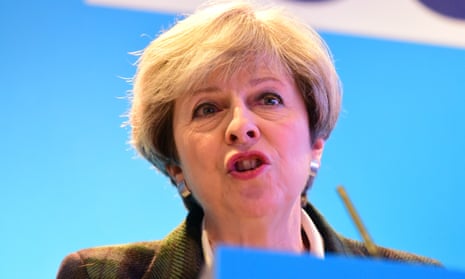Schools in England will face real-terms funding cuts for years to come if the Conservatives win the general election, according to analyses by two thinktanks. The figures show year-on-year falls over the coming parliamentary term despite a Conservative manifesto promise to redirect £1bn in additional funding to state schools by slashing free school meals for infants.
The Institute for Fiscal Studies (IFS) said that school funding would fall by nearly 3% by 2021 even with the additional £1bn a year, after adjusting for inflation and a rise in students enrolled.
“Taking account of forecast growth in pupil [numbers], this equates to a real-terms cut in spending per pupil of 2.8% between 2017–18 and 2021–22. Adding this to past cuts makes for a total real-terms cut to per-pupil spending of around 7% over the six years between 2015–16 and 2021–22,” the IFS said.
Its calculations cast doubt on the pledge in the Tory manifesto, launched by Theresa May last week, which stated: “We will increase the overall schools budget by £4bn by 2022, representing more than a real-terms increase for every year of the parliament.”
The IFS costed Labour’s promise to reverse the cuts seen in recent years at an additional £4.8bn, which would see school budgets rise over the next five years. Overall, secondary schools in England would get £500 more per pupil per year under Labour than under the Conservatives, the IFS calculated.
Proposals by the Liberal Democrats would see spending per pupil maintained in real terms over the course of the parliament, which the IFS said would require an extra £2.2bn compared with current spending.
“The commitments made by each of the main parties would imply quite different paths for school spending in the next parliament,” said the IFS’s Luke Sibieta, one of the authors of the research note. “Labour would increase spending per pupil by around 6% after inflation over the course of the parliament, taking it to just above its previous historic high in 2015. Proposals from the Conservatives would lead to a near 3% real-terms fall in spending per pupil over the parliament, taking it back to its 2010 level.”
The downbeat assessment comes a day after researchers called into question the viability of Tory plans for free school breakfasts in primary schools, replacing daily free lunches for infants but allocating just 25p per pupil for breakfasts.
Russell Hobby, the general secretary of the school leaders’ union NAHT, said: “This calls into question their other plans for school funding and makes it very confusing for those of us with the best interests of children at heart to understand whether any of their school funding proposals will hold water. School leaders will have a sense that this is just moving money around inside the system rather than a clear plan to invest in schools properly.”
The IFS figures agreed with a separate analysis published by the Education Policy Institute (EPI), the thinktank headed by former Liberal Democrat education minister David Laws.
The EPI said the Tory manifesto plans implied “a reduction in per pupil funding in real terms of around 7% between 2015-16 and 2021-22” and cuts of about 3% over the course of the next parliament.
While the Tories’ offers on education were modest compared with those of Labour, the EPI said they could still be blown off course. “The Conservatives have set themselves the toughest rules on reducing government borrowing, so in the face of an economic downturn they would face a choice between accepting higher government borrowing, raising taxes, or cutting back on public spending – including education,” the EPI said.
However the EPI also had strong criticism of Labour’s plans for abolishing university tuition fees and reinstating maintenance grant, which the IFS has estimated would cost up to £13.5bn. “Labour’s biggest spending commitment will have the least impact on under-represented disadvantaged students and most impact on middle-to-high-earning graduates,” the EPI said. “This does not seem an effective use of £11.5bn to £13.5bn if the aim of the policy is in part to aid social mobility amongst the most disadvantaged students.”
The EPI blasted May’s efforts to revive grammar schools in England, saying the evidence showed that selective schools “have no significant net positive or negative impact on pupil attainment – instead they modestly redistribute educational attainment towards those who gain entry to grammar schools and away from those who do not”.
It added: “Pupils from disadvantaged backgrounds are seriously under-represented in grammar schools, and so further expansion of these schools is likely to widen socio-economic attainment gaps.”

Comments (…)
Sign in or create your Guardian account to join the discussion